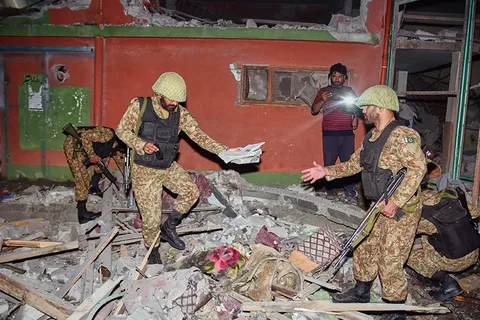Introduction
Tensions between India and Pakistan have escalated dramatically following a series of deadly attacks that Pakistan has labeled an “act of war.” Islamabad has vowed to retaliate, raising fears of a full-blown military confrontation between the two nuclear-armed neighbors. The latest hostilities come amid a long history of territorial disputes, cross-border skirmishes, and allegations of state-sponsored terrorism.
Background of the Conflict
India and Pakistan have been locked in conflict since their partition in 1947, primarily over the disputed region of Kashmir. Both nations claim the territory in full but control only parts of it. The Line of Control (LoC) divides the region, and frequent clashes between Indian and Pakistani troops have led to numerous casualties over the decades.
Recent years have seen heightened tensions, particularly after India’s revocation of Jammu and Kashmir’s special autonomy in 2019. Pakistan condemned the move, and militant activity in the region has since intensified.
The Latest Escalation
According to Pakistani officials, Indian forces carried out “unprovoked and targeted” strikes inside Pakistani territory, resulting in multiple civilian and military casualties. Pakistan’s Foreign Ministry described the attacks as a “blatant violation of international law” and an “act of aggression.”
Indian authorities, however, claim the strikes were preemptive operations against militant groups operating from Pakistani soil. New Delhi has long accused Pakistan of harboring and supporting terrorist organizations like Lashkar-e-Taiba (LeT) and Jaish-e-Mohammed (JeM), which have been linked to attacks in India.
Pakistan’s Response
Pakistan’s Prime Minister and military leadership have vowed a strong and decisive response. In a televised address, Pakistan’s army chief stated, “Any aggression against our sovereignty will be met with full force. We reserve the right to defend our territory and people at all costs.”
Diplomatic channels have also been activated, with Pakistan summoning India’s envoy and filing a complaint with the United Nations. Meanwhile, Pakistan’s allies, including China and Turkey, have called for restraint, while the U.S. and European Union have urged both sides to de-escalate.
International Concerns
The international community is closely monitoring the situation, given both nations’ nuclear capabilities. A direct military confrontation could have catastrophic consequences for regional and global security. The UN Security Council may convene an emergency session to mediate, though past efforts have had limited success.
Potential Scenarios
Limited Military Exchange – Both sides may engage in targeted strikes without escalating to full-scale war.
Diplomatic Mediation – Third-party intervention could lead to temporary de-escalation, though long-term solutions remain elusive.
Full-Scale Conflict – If retaliation spirals out of control, a larger war could erupt, with devastating humanitarian and economic consequences.
Conclusion
The latest flare-up between India and Pakistan marks one of the most dangerous moments in recent years. With both sides refusing to back down, the risk of further violence remains high. The world watches anxiously, hoping that cooler heads will prevail before the situation spirals into an irreversible crisis.
Key Takeaways:
Pakistan has declared India’s attacks an “act of war” and promised retaliation.
The conflict stems from decades of disputes, particularly over Kashmir.
International powers are urging restraint, fearing a nuclear standoff.
The next steps could determine whether the crisis escalates or de-escalates.
The coming days will be critical in shaping the future of India-Pakistan relations—and regional stability.

